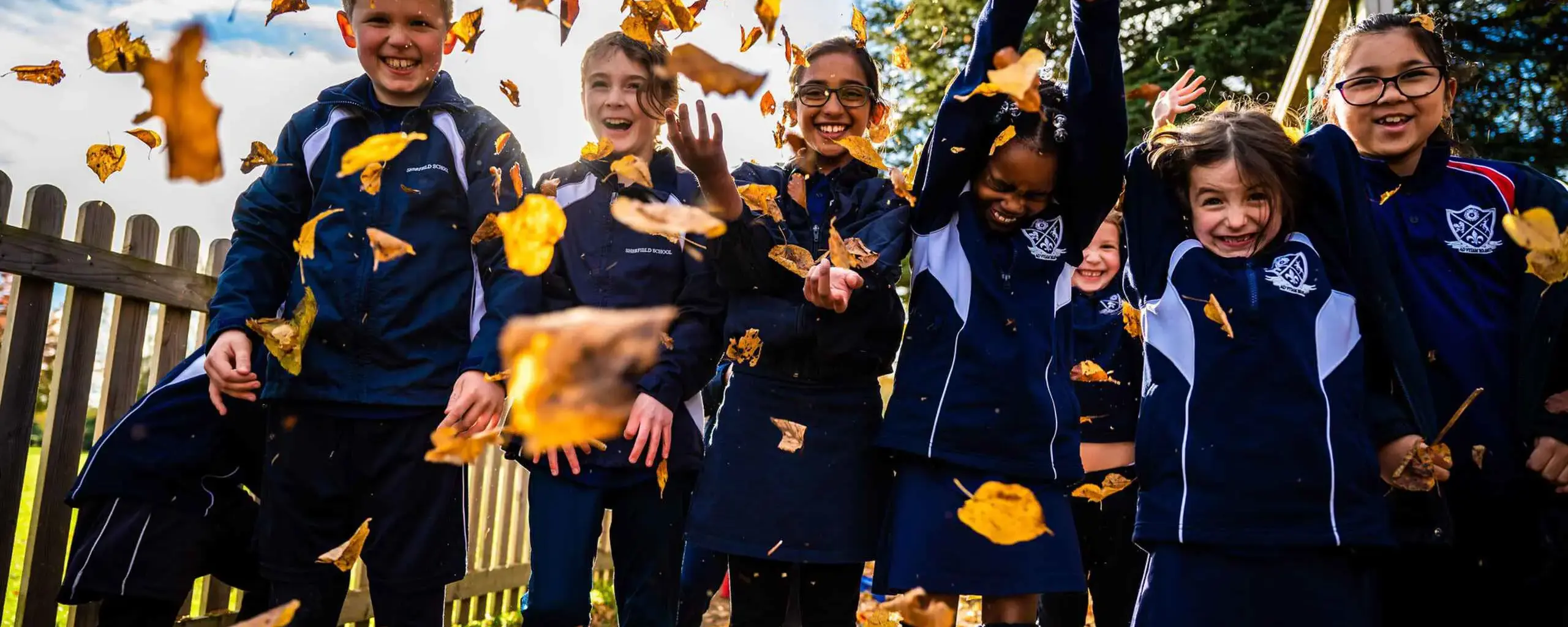SETTLE YOUR CHILDAt Sherfield
Top tips to help settle your child at school.
-
Visit the School and go to their open events together. Go on as many tours as they need so they can get to know where things are.
-
Ask the School if they have any events coming up that you can go to such as concerts, fairs, productions. This too will help them get used to the new school environment.
-
Look on the School website together, ask for their School newsletters, visit their social media pages and flick through the pictures and videos they have. Find the information and images of clubs, activities, trips and lessons you know your child will get excited about.
-
Make sure your child has all the right uniform and sports kit.
-
Show your child the School’s lunch menu.
-
Encourage your child to take part in the Schools clubs and extra-curricular activities. This will help them make friends quicker and often across year groups.
-
Try to involve yourself in the School so you can get to know the staff and parents. This will make meeting up with other parents and their children, outside of school, a lot easier.
For a Smooth Transition into Reception Class
| Sherfield is the place to be! |
|---|
| The Friends of Sherfield put on wonderful events throughout the year including a Christmas market, Summer Fair, Fireworks and more, so visit Sherfield when you can with your child. The more that your child gets used to the school, the easier the transition will be. You are also welcome to use the parent cafe we have at your own leisure, and can use this room to meet other parents and children from the school, whilst enjoying a complementary tea or coffee. |
| Let’s Talk about School |
| Ensure that you talk about school when you can in order to normalise it. This helps children to build up a picture of what to expect. For example, if you are out walking and see a lake, you could talk about how Sherfield has a lake too, and ask related questions such as ‘do you think Sherfield has ducks?’. Role play with your child being the student and teacher, introducing them to narratives that they may encounter when at school. You could set up a table each week in your house with activities for them to explore. For example, one week this might be a writing table, encouraging them to write sounds, words etc. The following week, you could change this to a creative area where they could paint or draw pictures. |
| Sharing is Caring |
| Ensure that you are asking your child how they feel about starting school, really listening to what they have to say. It is important not to brush off any concerns and that your child feels that their worries are valued. You could ask: “What are you most looking forward to?; Are you worried about anything? and What do you think your teacher will be like?”. Read books about starting school together, look on the Sherfield School website together, visit our social media pages and flick through the pictures and videos we have. Find the information and images of our clubs, activities, trips, food menu and lessons you know your child will get excited about. If your child seems anxious about school, try focusing on the things they’ll like best – maybe the sports, playground or new friends. Ensure that you communicate with us about any concerns that your child may have. |
| Sherfield Says Relax |
| Your child may not be the one who is anxious! It’s natural to feel nervous about your child starting school but remember that the teacher knows what they are doing and has seen hundreds of children starting school before. Your child can easily pick up on your emotions so if you don’t want to leave them at school, they won’t want to go. Ensure that you are always positive when talking about school - if you are enthusiastic and confident, they will be too. Avoid using any negative language such as “you’ll get in trouble if you behave like that at school”. |
| I can do it too! |
| When your child starts school, we encourage them to be as independent as possible - a child who can do things for themselves will feel happier and more settled. There are many useful skills you can practise to help your child become independent and confident at school including: putting on a coat; sitting up at a table; eating with a knife and fork; using a tissue to blow their nose; washing their own hands; tidying up after themselves and being fully toilet trained during the day (including wiping). Don’t worry if your child can’t do all these things before they start school. The teachers will help them learn these skills, so let them know what your child finds tricky. |
| Strike a Pose |
| Your child will enjoy trying on their smart new uniform and role playing being at school. Let them practise getting undressed and dressed ready for the big day, you can even use a timer to make it more fun and this also helps with their speed. There are a lot of items on your school uniform list, many of which they may have not had to wear before. It is important to introduce each of the items, talking through their names (blazer may throw some) and discussing when we wear them. When shopping for new uniform, ensure that you place your order from Stevensons (Reading) with plenty of time as they get very busy! Teach them tricks like laying the clothing on the floor, having the labels at the back, rolling up tights and holding cuffs to avoid sleeves riding up. Why not take a photograph of them in their new uniform and stick it to the fridge, to help them picture themselves at school? Sometimes children lose parts of their uniform, so please ensure everything is clearly labelled! |
| What’s your name? |
| Help them to recognise their name. Your child won’t be expected to write their own name independently at the start of school, but it’s often helpful if they can recognise their name on a coat peg or label. Putting their name on their door to their room is a quick and easy way to enable them to see their name on a daily basis. You can also play ‘spot my name games’ including putting your child’s name and other names on post it notes around the house and see if they can spot their name. If your child is ready, why not practise writing some of the sounds in sand, glitter and/or foam. If you have magnetic letters, this is a fun way to build their name. However, they may need their name written down to refer to it. When your child draws picture, you could write their name in highlighter and then ask them to write over your writing. |
| Sherfield Says |
| Games such as ‘Simon Says’ and ‘Can you find?’ are great for helping little ones practice their listening skills, which will be an important skill at school, where they will need to follow their teacher’s instructions. Once they’ve mastered simple instructions, try adding two or three together: “Take off your coat then wash your hands and sit down at the table please”. Encourage your child to ask questions, ensuring that you are also modelling how to ask questions to them. |
| Make a Date |
| If you already know some of the other children that go to Sherfield or that will be starting in Reception class too, why not organise a play date or outing together before school starts? As well as helping the youngsters to develop their social skills, it’s helpful for you to be able to chat about your own feelings and anxieties with the parents, who may be feeling the same. Most classes have a Whatsapp group which all of the parents are part of, this is a quick and easy way for parents to communicate something to the other parents. For example, it is a great way to find lost jumpers or just to socialise with the other parents. You will quickly find out that the Sherfield parents make strong bonds with each other and you too as the parents will develop a friendship group (not just the children). |



